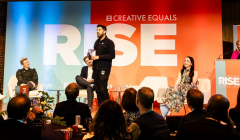
Are we leaving men and boys behind?
At Creative Equal’s RISE event, industry leaders consider how to reframe boys and men in marketing

"The interesting thing about B Corp is that you can put profit on equal merit with people and planet. It doesn’t mean you have to make a choice between one or other. It means you can do both."

It’s not for all companies but I would argue that those companies that embrace B Corp are the ones that are going to be commercially more successful and they’re going to be the ones that are around in 10, 20 years’ time.
Mark Cuddigan
The interesting thing about B Corp is that you can put profit on equal merit with people and planet. It doesn’t mean you have to make a choice between one or other. It means you can do both.
Xavier Rees
Now, particularly millennials are demanding more, which is great because if we’re going to demand more, we’re going to demand more transparency from our companies that we buy from and work for.
Mark Cuddigan
Looks like you need to create a Creativebrief account to perform this action.
Create account Sign inLooks like you need to create a Creativebrief account to perform this action.
Create account Sign in